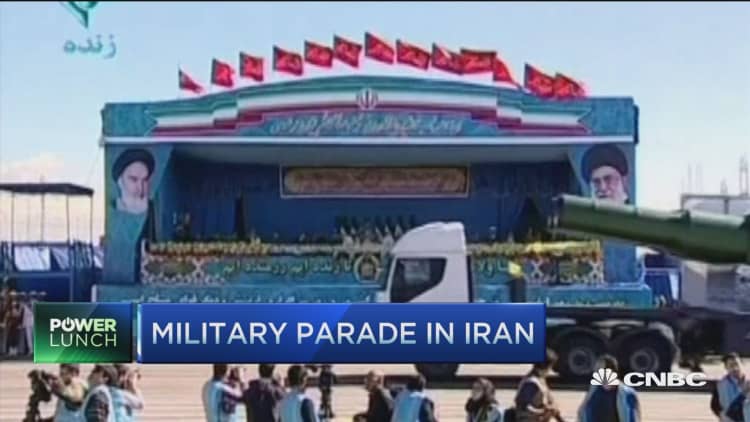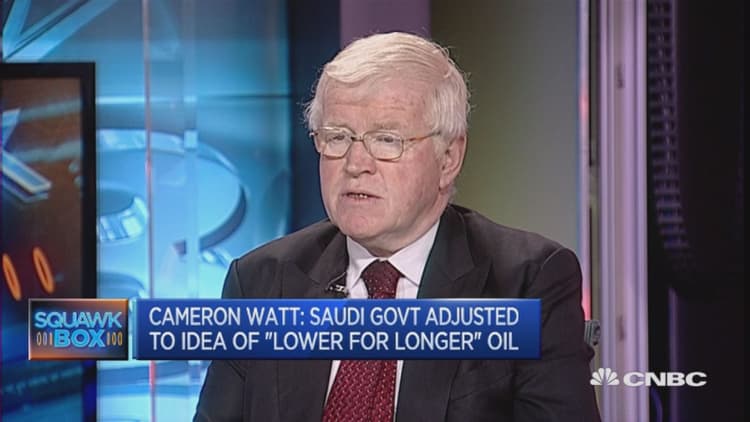
Iran has a message for the world's financial institutions: We want to do business again.
Representatives of the Iranian government met the week before last with the Financial Action Task Force, the international body that has blacklisted the country from the global financial system. It was the first such meeting in eight years, and Iran's willingness to do so may signal that it isn't getting as much economic pop from the end of nuclear sanctions as it hoped it would.
The governor of Iran's Central Bank, Valiollah Seif, disclosed the meeting, which took place in Paris, during an interview with CNBC. Seif said FATF representatives "were surprised by the steps taken by the Iranian banks and financial institutions," and "that they were not aware of the changes we have made in our banking sector."
Iran's eagerness to get off the blacklist is likely related to the difficulty it faces accessing money that is owed to Iran but sitting in accounts overseas. Although Iran is now permitted to access those accounts, other sanctions related to the country's links to terrorism make European banks unwilling to convert those accounts into U.S. dollars, which is standard practice for transferring money throughout the world.
Seif expressed confidence that Iranian banks would be removed from the blacklist, though he didn't give a time frame.
FATF confirmed a recent meeting but declined to comment on its content or the tone. It would only say that "FATF manages a process to ensure that countries throughout the world comply with international anti-money laundering and counter-terrorist financing standards. This is a rigorous, apolitical, highly technical, and often lengthy process. The review of Iran will be treated in the same impartial manner that all countries subject to similar reviews have been treated."


But a quick change in position from FATF is highly unlikely. In February, the institution issued the following statement: "FATF remains particularly and exceptionally concerned about Iran's failure to address the risk of terrorist financing and the serious threat this poses to the integrity of the international financial system."
It went on to urge nations to take counter measures against Iran to protect their own banking sectors from money laundering and and terrorism financing risks emanating from Iran. FATF warned that if Iran didn't take further steps, it would urge countries to implement stronger counter measures at its next scheduled meeting in June.
Governor Seif described Iran's inclusion on the list — the only other country on it is North Korea — as unfair, and "not compatible with the facts on the ground and the changes we have made." He cited the implementation of an anti-money laundering bill passed three years ago, and a new "combating of terrorism" law passed by the Iranian parliament last month.
I think the Iranians completely misjudged how the non-nuclear sanctions were going to deter international financial institutions.Mark Dubowitzexecutive director, Foundation for the Defense of Democracies
U.S. Secretary of State John Kerry during a meeting with Iran's foreign minister last week acknowledged that there is "confusion among foreign banks" with regard to Iran and "we want to clarify that as much as we can."
"I think the Iranians completely misjudged how the non-nuclear sanctions were going to deter international financial institutions," said Mark Dubowitz, executive director of the Foundation for the Defense of Democracies, which opposes any easing Iran's access to international financial transactions involving the dollar. "If they had known, they would have negotiated dollarized agreements."
Both critics and supporters of U.S. engagement with Iran say it will be a long and difficult process for Iran to get off the FATF blacklist.
Tyler Cullis of the National Iranian American Council, which supports greater engagement with Iran, called Iran's meeting with FATF a "significant step," because many of the surviving U.S. sanctions are "hinged on Iran's status at the FATF."
But he acknowledged "it's one thing to draft a law, it's another to comply with it," citing as an example deficiencies in what are known as "beneficial ownership rules," which can make it difficult to known who owns certain assets.
Cullis and his group are supportive of the administration finding a work around that would allow Iran access to this money, seeing it as a way of fulfilling the U.S. obligations of the nuclear accord and providing them some benefit.
Dubowitz of the Foundation for Defense of Democracies dismissed Iran's meeting in Paris as part of a "charm offensive" to undo a "decades- long rap sheet of financial crimes."
Ultimately, there is still a large amount of "market anxiety" about the risks of doing business with Iran, especially in the wake of large fines imposed in recent years, Dubowitz said.





